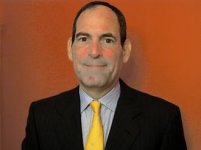Here's your man from today Pittsburgh Post:
HARRISBURG -- When Michael Krancer found himself the deciding vote on a mine-safety case in 2001, he went to the bottom of a Washington County mine to make sure he understood the issues at hand.
The United Mine Workers were appealing an exemption approved by the Department of Environmental Protection regarding methane testing at 84 Mining Co.'s mine in South Strabane. The union said the exemption was unsafe, despite DEP's consent.
Mr. Krancer was two years into his initial term as a judge on the state's Environmental Hearing Board, which considers appeals on certain DEP decisions. And he had never been in a coal mine, recounted Don Carmelite, his first law clerk at the board.
"The guy suited up in all the gear and got the training, and he walked around in a mine a mile below the surface, in thigh-high water," Mr Carmelite said in a recent interview. "It was consistent with what he did to get it right."
The judge later sided with the miners' position, on a 3-2 decision.
But now instead of adjudicating whether the state Department of Environmental Protection made the right decisions, it's Mr. Krancer who is managing the agency's closely watched choices. He is Gov. Tom Corbett's pick to lead the oversight agency.
The 53-year-old Bryn Mawr lawyer comes to the agency at a pivotal time: Natural gas drilling in the Marcellus Shale has grown so quickly that the topic overshadows much of the department's other responsibilities. Discussions on how government should regulate the industry and manage its risks often can become heated and hyperbolic.
He also is working for a governor who has drawn skepticism from environmental advocates regarding his commitment to protection, in light of significant campaign contributions from gas drillers and his opposition to a severance tax. Mr. Krancer himself was at times harshly critical of the agency in his hearing board opinions.
Colleagues and friends say he's the right man for the job: intellectually curious, hard-working, and someone constantly in search of facts and science to back up his decisions.
They and others also note that he is not afraid to voice disagreement, and some of his hearing board dissents show fiery language when he believed that a decision was made in error.
Mr. Krancer has said he will approach his role as secretary much as he did his nine years as an administrative judge .
"We apply the law -- that's our job," he said during his Senate confirmation hearing, adding that it is "also my job to listen to all sides of an issue and consider all of the facts and have an open mind."
Chief Judge Tom Renwand, who has served on the board since 1995, echoed that sentiment in describing his colleague: "He's fair and likes to hear all sides in an argument. I think he will really be guided by science."
Mr. Renwand said the Environmental Hearing Board functions with a lot of "back and forth" on cases that are under consideration. He talked to Mr. Krancer almost daily from the time Mr. Krancer joined the board in 1999, often to bounce around ideas about a case.
"His opinions contained great detail and always delved into the nuts and bolts of testimony and were greatly supported by facts, which is the key to not getting reversed," Mr. Renwand said.
Attorneys who try cases before him see that attention to detail in his questions.
"The kind of things you think are questionable in your case, he'll go right for them," said Joe Manko, an environmental lawyer with the Philadelphia firm Manko Gold Katcher & Fox.
The Environmental Hearing Board is the first stop for appeals on DEP decisions, explained former DEP secretary John Hanger. He said it functions as a check on the agency, which "can make mistakes, misread the facts."
Those cases give the judges insights on the agency's legal decision-making, Hanger said, though "hardly a full view of what the department does."
Some of Mr. Krancer's opinions also show insights into his own decision-making. A review of those decisions shows a mix that both supports strong regulations and criticizes agency actions.
In a 2001 case involving penalties imposed against a construction company, his concurring opinion voiced concern that the company may still have profited from its illegal action, despite a $258,500 fine.
He wrote that the approach in cases that "involve such a flagrant and volitional course of chronic violative conduct should be at a minimum, to make sure that any and all profit that the violator may have made on the job on which it engaged in its pattern of illegal conduct is totally disgorged."
Mr. Carmelite said the opinion is an example of his "strong position on enforcement on people who are bad actors."
That same year, in a dispute over air regulations between DEP and the North American Refractories Co., Mr. Krancer broke from the other judges to write a dissent that the Commonwealth Court later validated.
That decision states that when the department and the defendant both have reasonable positions, the department's position should be given deference.
Under state law, he wrote, "the Department is the 'king of the hill' going into the proceeding because NARCO has the burden of proving that its position is correct and the Department's is incorrect. Under the circumstances here, I do not think that NARCO has knocked the Department off the top of the hill."
However, Mr. Manko said he is "not somebody who would always toe the line of the department. I'm sure there are cases where they were disappointed."
One such case involved how DEP was overseeing mine safety, and whether it or the Board of Coal Mine Safety was empowered to expand mine regulations.
In that 2009 case, the majority, including Mr. Krancer, ruled that the agency had overstepped its bounds. But in a concurring opinion, he went beyond his fellow judges' tone to call DEP's attempt to expand regulations "a naked power grab" that was "inappropriate and offensive to the rule of law and the democratic process."
That language upset some in the department as improper and unprofessional.
He never shied away from making the decision he felt was right, even under pressure for unified 5-0 decisions, Mr. Carmelite said
"The fact that he wrote a couple of dissents early on challenged his compatriots and bred an atmosphere of discussion and dialogue," Mr. Carmelite said. He added that the other judges initially viewed Mr. Krancer's approach as "grandstanding," though later became more accepting.
His legal background goes beyond the Environmental Hearing Board: He started his career at the Philadelphia firms Dilworth Paxson and Blank Rome. In 2007, he left the hearing board to run for the state Supreme Court on the Republican ticket.
He lost that bid, which was largely financed by his father, GOP philanthropist Ronald Krancer. His father also has been a major donor to both Mr. Corbett and Gov. Ed Rendell, and is the nephew of the late Walter Annenberg.
After his Supreme Court bid, Mr. Krancer spent a year as assistant general counsel for the energy company Exelon. Mr. Rendell reappointed him to the Environmental Hearing Board in 2009.
He has a strong interest in history, particularly U.S. naval history and spends off-work hours as a civil war re-enactor.
As acting secretary, Mr. Krancer already has made and defended several regulatory changes from the previous administration. He revoked a coordination policy with the Department of Conservation and Natural Resources that he said was redundant, and erased guidance on air pollution policy that he said "did not instruct anybody to do anything."
He also has echoed his boss on viewing Marcellus gas drilling as an opportunity for jobs that will last decades, and something that government needs to manage in a way that does not scare away investment.
"We're at the beginning of what I hope will be a very, very successful industry that has geopolitical impacts," he told House lawmakers during a recent hearing.
Much of his message on how he will manage the department has been a promise for openness between DEP staff, other arms of state government and the public. He's greeted DEP employees on their way into work at the Harrisburg headquarters, visited regional offices and is soliciting ideas from lawmakers.
Mr. Renwand said he thinks Mr. Krancer will be a "strong leader" at DEP.
"Will he take a different tack [than Hanger]? I don't know," Mr. Renwand said. A lot of people try to politicize things but I'm not sure, if you look back over the last 15 years, that people in charge handle things much differently except maybe around the edges. I think he'll uphold the law. He always did on the board."
Laura Olson: 717-787-4254 or lolson@post-gazette.com. Don Hopey contributed to this report.
First published on March 20, 2011 at 12:00 am
Read more: http://www.post-gazette.com/pg/11079/1133016-454.stm#ixzz1H9Fr7hSe





